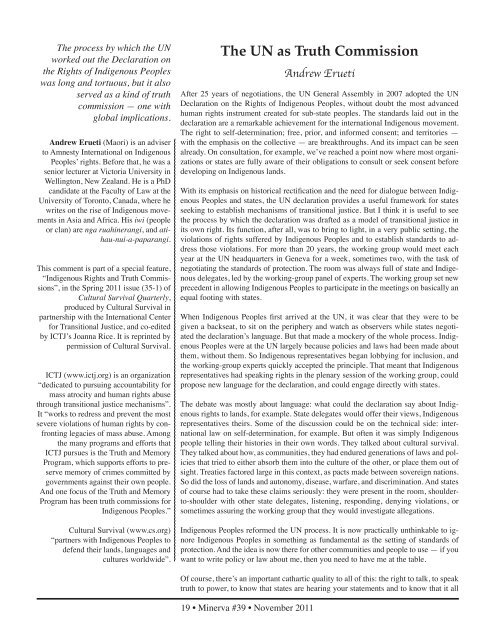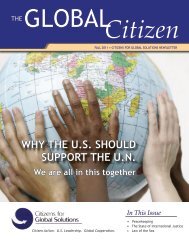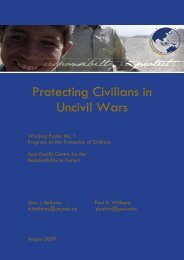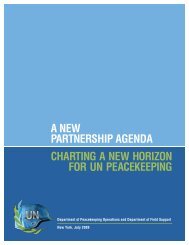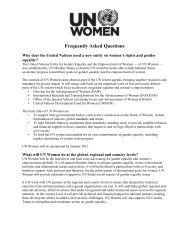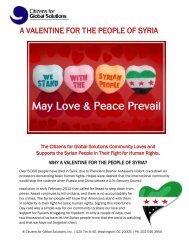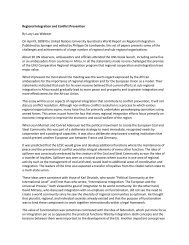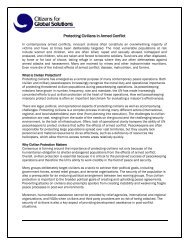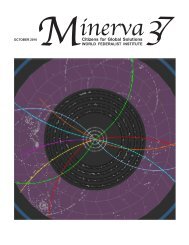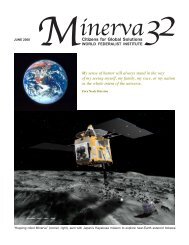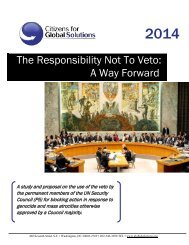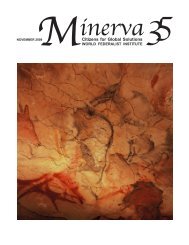Minerva, Fall 2011 - Citizens for Global Solutions
Minerva, Fall 2011 - Citizens for Global Solutions
Minerva, Fall 2011 - Citizens for Global Solutions
- No tags were found...
Create successful ePaper yourself
Turn your PDF publications into a flip-book with our unique Google optimized e-Paper software.
The process by which the UNworked out the Declaration onthe Rights of Indigenous Peopleswas long and tortuous, but it alsoserved as a kind of truthcommission — one withglobal implications.Andrew Erueti (Maori) is an adviserto Amnesty International on IndigenousPeoples’ rights. Be<strong>for</strong>e that, he was asenior lecturer at Victoria University inWellington, New Zealand. He is a PhDcandidate at the Faculty of Law at theUniversity of Toronto, Canada, where hewrites on the rise of Indigenous movementsin Asia and Africa. His iwi (peopleor clan) are nga ruahinerangi, and atihau-nui-a-paparangi.This comment is part of a special feature,“Indigenous Rights and Truth Commissions”,in the Spring <strong>2011</strong> issue (35-1) ofCultural Survival Quarterly,produced by Cultural Survival inpartnership with the International Center<strong>for</strong> Transitional Justice, and co-editedby ICTJ’s Joanna Rice. It is reprinted bypermission of Cultural Survival.ICTJ (www.ictj.org) is an organization“dedicated to pursuing accountability <strong>for</strong>mass atrocity and human rights abusethrough transitional justice mechanisms”.It “works to redress and prevent the mostsevere violations of human rights by confrontinglegacies of mass abuse. Amongthe many programs and ef<strong>for</strong>ts thatICTJ pursues is the Truth and MemoryProgram, which supports ef<strong>for</strong>ts to preservememory of crimes committed bygovernments against their own people.And one focus of the Truth and MemoryProgram has been truth commissions <strong>for</strong>Indigenous Peoples.”Cultural Survival (www.cs.org)“partners with Indigenous Peoples todefend their lands, languages andcultures worldwide”.The UN as Truth CommissionAndrew EruetiAfter 25 years of negotiations, the UN General Assembly in 2007 adopted the UNDeclaration on the Rights of Indigenous Peoples, without doubt the most advancedhuman rights instrument created <strong>for</strong> sub-state peoples. The standards laid out in thedeclaration are a remarkable achievement <strong>for</strong> the international Indigenous movement.The right to self-determination; free, prior, and in<strong>for</strong>med consent; and territories —with the emphasis on the collective — are breakthroughs. And its impact can be seenalready. On consultation, <strong>for</strong> example, we’ve reached a point now where most organizationsor states are fully aware of their obligations to consult or seek consent be<strong>for</strong>edeveloping on Indigenous lands.With its emphasis on historical rectification and the need <strong>for</strong> dialogue between IndigenousPeoples and states, the UN declaration provides a useful framework <strong>for</strong> statesseeking to establish mechanisms of transitional justice. But I think it is useful to seethe process by which the declaration was drafted as a model of transitional justice inits own right. Its function, after all, was to bring to light, in a very public setting, theviolations of rights suffered by Indigenous Peoples and to establish standards to addressthose violations. For more than 20 years, the working group would meet eachyear at the UN headquarters in Geneva <strong>for</strong> a week, sometimes two, with the task ofnegotiating the standards of protection. The room was always full of state and Indigenousdelegates, led by the working-group panel of experts. The working group set newprecedent in allowing Indigenous Peoples to participate in the meetings on basically anequal footing with states.When Indigenous Peoples first arrived at the UN, it was clear that they were to begiven a backseat, to sit on the periphery and watch as observers while states negotiatedthe declaration’s language. But that made a mockery of the whole process. IndigenousPeoples were at the UN largely because policies and laws had been made aboutthem, without them. So Indigenous representatives began lobbying <strong>for</strong> inclusion, andthe working-group experts quickly accepted the principle. That meant that Indigenousrepresentatives had speaking rights in the plenary session of the working group, couldpropose new language <strong>for</strong> the declaration, and could engage directly with states.The debate was mostly about language: what could the declaration say about Indigenousrights to lands, <strong>for</strong> example. State delegates would offer their views, Indigenousrepresentatives theirs. Some of the discussion could be on the technical side: internationallaw on self-determination, <strong>for</strong> example. But often it was simply Indigenouspeople telling their histories in their own words. They talked about cultural survival.They talked about how, as communities, they had endured generations of laws and policiesthat tried to either absorb them into the culture of the other, or place them out ofsight. Treaties factored large in this context, as pacts made between sovereign nations.So did the loss of lands and autonomy, disease, warfare, and discrimination. And statesof course had to take these claims seriously: they were present in the room, shoulderto-shoulderwith other state delegates, listening, responding, denying violations, orsometimes assuring the working group that they would investigate allegations.Indigenous Peoples re<strong>for</strong>med the UN process. It is now practically unthinkable to ignoreIndigenous Peoples in something as fundamental as the setting of standards ofprotection. And the idea is now there <strong>for</strong> other communities and people to use — if youwant to write policy or law about me, then you need to have me at the table.Of course, there’s an important cathartic quality to all of this: the right to talk, to speaktruth to power, to know that states are hearing your statements and to know that it all19 • <strong>Minerva</strong> #39 • November <strong>2011</strong>


